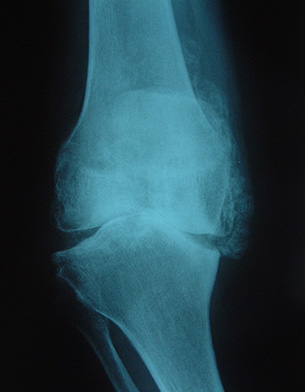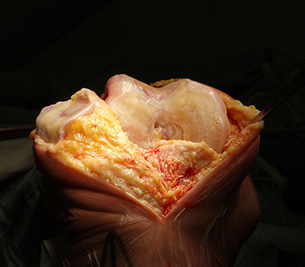
X-Ray of a patient with severe osteoarthritis (OA) of the knee. Most of the articular cartilage (gristle) has been worn away and the joint is very deformed. This would be a typical reason for offering a total knee replacement.

An osteoarthritic knee as seen at total knee replacement. Look at the areas of gristle loss and the lumpy margins of the joint (osteophytes) that are so classic of osteoarthritis.
As little as ten years ago, public opinion of knee replacement was not good. Many would say, "But they don't last very long do they, doctor?" Nothing could be further from the truth. Knee replacement is now big business, with more than 70,000 per year being undertaken in the UK, a number that is rising exponentially. The global figure is of the order of one million. Time was when more hip replacements were being performed than knee replacements. In many parts of the world this has been reversed, knees now being the dominant joint. Success rates are also improving. Already very favourable 12-15 year results are being reported.
Knee Replacement - Results
The results of knee replacement are many and diverse. As a rough guide one can say that approximately 8% of primary knee replacements will be loose at ten years after surgery. One can consider the results in more detail, however:
Results for cemented knee replacement
In the early days of hinged knee replacement, up to 75% were functioning six years after surgery. However, infection rates could be as high as 13%. Rotating hinges showed 60% success at 4 years, although with an 11% infection rate. Total condylar replacements show 92% success at 12 years, an excellent result.
Results for cementless knee replacement
Approximately 93% of certain cementless designs show good function at 10 years after surgery.
Results for revision knee replacement
For revisions, infection rates are higher, as high as 19% in some studies. Nevertheless, a success rate of 70-80% can be expected in the short term.
Results for unicompartmental (partial) knee replacement
An over 80% success rate at 10 years can be found but this is very variable.
